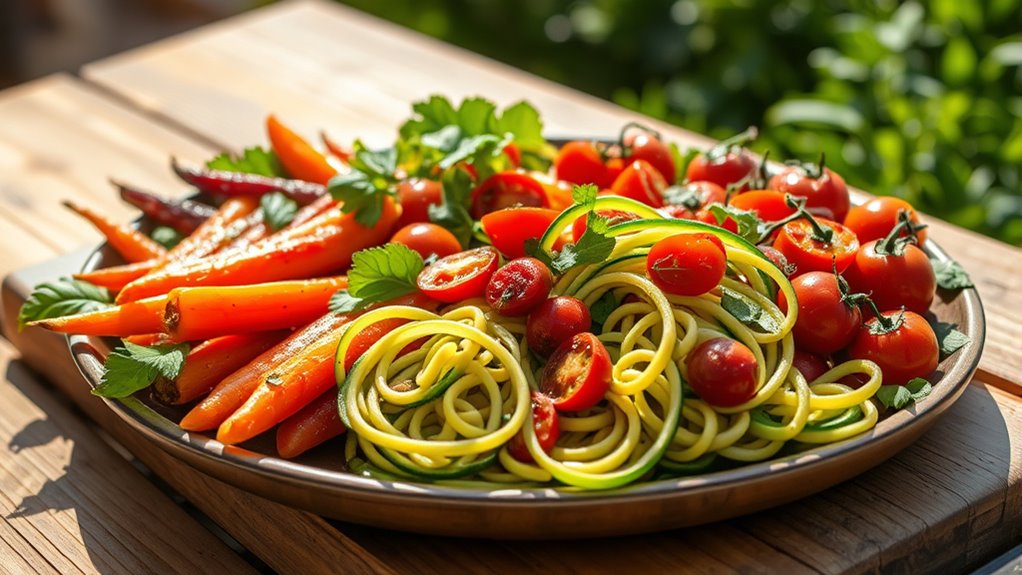Adding plant-based dishes to your meals can considerably lower your environmental impact by using fewer resources and emitting less greenhouse gases. Choosing ingredients like soy, peas, or mushrooms sourced responsibly helps protect ecosystems and supports fair labor practices. These dishes are not only sustainable but also delicious and easy to prepare, fitting into busy lifestyles. By making such choices, you contribute to a healthier planet—and you’ll discover how simple it is to make a lasting difference.
Key Takeaways
- Incorporate plant-based dishes to reduce environmental impact and lower greenhouse gas emissions.
- Use sustainably sourced ingredients like soy, peas, and mushrooms to minimize resource use.
- Promote flavorful, convenient recipes that encourage adoption of plant-based eating habits.
- Foster a growth mindset to support lasting dietary changes benefiting health and sustainability.
- Support responsible supply chains and brands committed to environmentally friendly practices.

Have you ever considered how switching to plant-based dishes can promote sustainability? Making this change isn’t just about healthier eating; it’s a powerful step toward reducing your environmental impact. One of the key reasons to embrace plant-based options is the availability of meat alternatives that mimic traditional favorites while requiring fewer resources. These alternatives often use ingredients like soy, peas, or mushrooms, which need considerably less land, water, and energy compared to conventional meat production. By choosing meat alternatives, you contribute to lowering greenhouse gas emissions and conserving essential natural resources. It’s a simple way to enjoy familiar textures and flavors without the environmental toll associated with traditional meat.
Switching to plant-based foods reduces resource use and environmental impact while still delivering familiar flavors and textures.
Another fundamental aspect of incorporating plant-based dishes is the emphasis on sustainable sourcing. When you select ingredients, look for brands and suppliers that prioritize environmentally friendly practices. Sustainable sourcing ensures that crops are grown responsibly, with minimal use of pesticides and fertilizers, and that supply chains support fair labor practices. This approach helps protect ecosystems, reduce pollution, and foster ethical farming communities. By consciously choosing ingredients that are sustainably sourced, you’re encouraging the industry to adopt better practices and making a statement that environmental responsibility matters. It’s about aligning your eating habits with your values, supporting farms and companies that prioritize the planet’s health.
Adding plant-based dishes to your diet doesn’t mean giving up flavor or satisfaction. In fact, many recipes are crafted with bold spices, herbs, and innovative cooking techniques that make plant-based meals just as delicious and fulfilling as their meat-based counterparts. Plus, preparing these dishes often involves fewer steps and less clean-up, making them convenient for busy lifestyles. You can experiment with hearty lentil stews, veggie stir-fries, or grain bowls topped with roasted vegetables. Incorporating more plant-based meals into your weekly routine can markedly reduce your carbon footprint, especially when combined with choosing locally sourced, sustainably grown ingredients. It’s a practical way to make a positive difference without sacrificing taste or nutrition.
Furthermore, understanding the importance of growth mindset in adopting new eating habits can empower you to make lasting changes that benefit both your health and the environment. Ultimately, shifting toward plant-based dishes is an accessible and impactful way to support sustainability. By opting for meat alternatives that rely on sustainable sourcing, you help lessen the strain on our planet’s resources. Every meal you choose can be a statement of environmental stewardship, encouraging a more responsible food system. It’s not about perfection but progress—each plant-based meal is a step toward a healthier planet and a more sustainable future. Your choices matter, and by embracing these options, you become part of a movement that values environmental integrity alongside delicious, nourishing food.
Frequently Asked Questions
How Can I Easily Incorporate More Plant-Based Dishes Into My Diet?
You can easily incorporate more plant-based dishes into your diet by exploring simple meal prep ideas like veggie stir-fries or grain bowls. Use flavor enhancement techniques such as herbs, spices, and citrus to make these dishes exciting. Keep a variety of plant-based ingredients on hand, and plan your meals ahead of time. This approach helps you enjoy nutritious, sustainable meals without feeling overwhelmed or sacrificing taste.
What Are Common Misconceptions About Plant-Based Eating?
Many people believe that plant-based eating lacks sufficient protein or essential nutrients, but that’s a nutritional myth. Myth busting reveals that a well-planned plant-based diet provides everything you need. Some think it’s expensive or boring, yet with diverse options, it’s affordable and flavorful. Don’t fall for common misconceptions—plant-based eating can be nutritious, satisfying, and easy to incorporate into your lifestyle.
Are Plant-Based Dishes Suitable for All Dietary Restrictions?
You’ll find that plant-based dishes can suit most dietary restrictions. Studies show that well-planned vegetarian diets meet nutritional adequacy for most people. The culinary versatility of plant-based options means you can customize meals for gluten-free, nut allergies, or low-carb needs. Just guarantee you select ingredients carefully, and you’ll enjoy flavorful, inclusive meals that cater to diverse dietary needs without sacrificing nutrition or taste.
How Do Plant-Based Dishes Impact Local Farmers and Economies?
Plant-based dishes can positively impact local farmers and economies by boosting economic benefits through increased demand for plant crops. You might notice farmers adopting more sustainable farming practices to meet this demand, which can lead to better land management and reduced environmental impact. As you support plant-based options, you’re helping local farmers grow more diverse crops, strengthening the local economy and encouraging eco-friendly farming methods.
What Are Cost-Effective Ways to Start Eating Plant-Based Regularly?
To start eating plant-based regularly on a budget, focus on budget-friendly options like beans, lentils, and frozen vegetables. Incorporate seasonal produce, which is often cheaper and fresher. Plan simple meals around these ingredients and cook in bulk to save money. Use versatile staples like rice and oats to create nutritious, filling dishes without overspending. This approach makes plant-based eating accessible and sustainable for your lifestyle.
Conclusion
By embracing plant-based dishes, you hold the key to a greener future. Each meal becomes a seed of change, planting hope in the soil of our planet. As you choose compassion over convenience, you’re nurturing a world where forests flourish and oceans breathe freely. Your small act of kindness today blooms into a legacy of sustainability, proving that together, our choices can transform the earth into a vibrant, thriving garden for generations to come.








